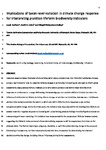Implications of taxon-level variation in climate change response for interpreting plankton lifeform biodiversity indicators
| dc.contributor.author | Bedford, J | |
| dc.contributor.author | Johns, DG | |
| dc.contributor.author | McQuatters-Gollop, A | |
| dc.date.accessioned | 2021-08-09T16:00:37Z | |
| dc.date.available | 2021-08-09T16:00:37Z | |
| dc.date.issued | 2020-12-01 | |
| dc.identifier.issn | 1054-3139 | |
| dc.identifier.issn | 1095-9289 | |
| dc.identifier.uri | http://hdl.handle.net/10026.1/17525 | |
| dc.description.abstract |
<jats:title>Abstract</jats:title> <jats:p>Indicators based on broad functional characteristics, which group plankton taxa into “lifeforms”, summarize changes across a high number of taxa in a way that reflects changes in community functioning and are used to inform policy assessments. Key questions remain, however, as to what extent plankton taxa within these lifeforms share responses to environmental change. Addressing this knowledge gap can provide additional information on the influence of environmental drivers, including climate change, on plankton communities. Here, we use a multi-decadal plankton time series to examine the extent to which taxa within lifeforms share responses to sea surface temperature (SST) change. At the North Sea scale, the individual taxa responses within the dinoflagellate lifeform are skewed towards a negative response to increasing SST, consolidating previous findings that dinoflagellate abundance is decreasing with ocean warming. The individual taxa responses within the zooplankton lifeforms, however, varied, suggesting that lifeform traits are less of a factor determining response to SST for zooplankton than for phytoplankton. The lifeform level of grouping taxa, therefore, is useful for communicating change in the state and functioning of ecosystems, but finer taxonomically resolved data are essential for determining the drivers of plankton community change, including climate influences, during formal assessments.</jats:p> | |
| dc.format.extent | 3006-3015 | |
| dc.language | en | |
| dc.language.iso | en | |
| dc.publisher | Oxford University Press (OUP) | |
| dc.subject | biodiversity indicators | |
| dc.subject | climate change | |
| dc.subject | community ecology | |
| dc.subject | functional traits | |
| dc.subject | taxonomy | |
| dc.title | Implications of taxon-level variation in climate change response for interpreting plankton lifeform biodiversity indicators | |
| dc.type | journal-article | |
| dc.type | Journal Article | |
| plymouth.author-url | https://www.webofscience.com/api/gateway?GWVersion=2&SrcApp=PARTNER_APP&SrcAuth=LinksAMR&KeyUT=WOS:000610522000055&DestLinkType=FullRecord&DestApp=ALL_WOS&UsrCustomerID=11bb513d99f797142bcfeffcc58ea008 | |
| plymouth.issue | 7-8 | |
| plymouth.volume | 77 | |
| plymouth.publication-status | Published | |
| plymouth.journal | ICES Journal of Marine Science | |
| dc.identifier.doi | 10.1093/icesjms/fsaa183 | |
| plymouth.organisational-group | /Plymouth | |
| plymouth.organisational-group | /Plymouth/Faculty of Science and Engineering | |
| plymouth.organisational-group | /Plymouth/Faculty of Science and Engineering/School of Biological and Marine Sciences | |
| plymouth.organisational-group | /Plymouth/REF 2021 Researchers by UoA | |
| plymouth.organisational-group | /Plymouth/REF 2021 Researchers by UoA/UoA07 Earth Systems and Environmental Sciences | |
| plymouth.organisational-group | /Plymouth/Users by role | |
| plymouth.organisational-group | /Plymouth/Users by role/Academics | |
| plymouth.organisational-group | /Plymouth/Users by role/Researchers in ResearchFish submission | |
| dcterms.dateAccepted | 2020-08-31 | |
| dc.rights.embargodate | 2021-11-9 | |
| dc.identifier.eissn | 1095-9289 | |
| dc.rights.embargoperiod | Not known | |
| rioxxterms.versionofrecord | 10.1093/icesjms/fsaa183 | |
| rioxxterms.licenseref.uri | http://www.rioxx.net/licenses/all-rights-reserved | |
| rioxxterms.licenseref.startdate | 2020-12-01 | |
| rioxxterms.type | Journal Article/Review | |
| plymouth.funder | Plankton science for supporting the implementation of marine ecosystem-based management and conservation::NERC |


